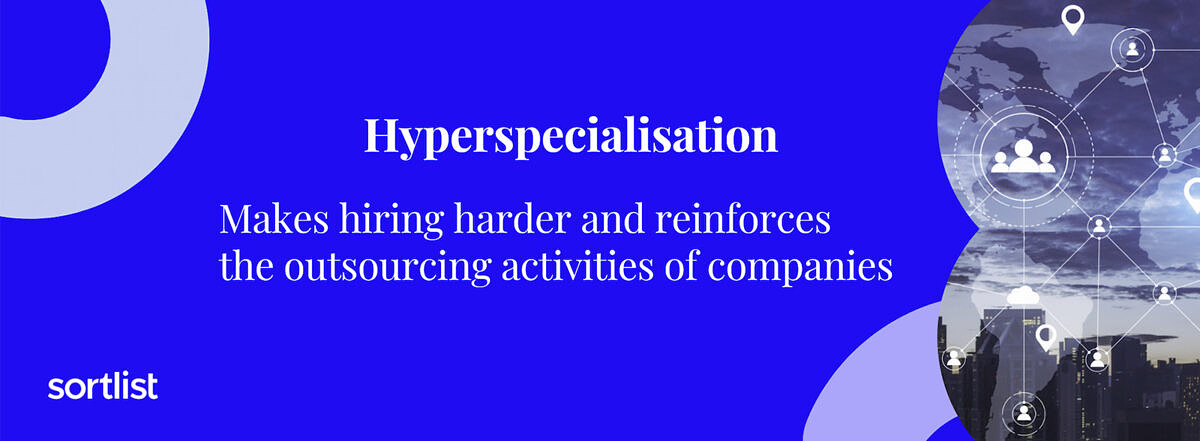In-house or outsourcing? Why the top organisations of the future will hire differently.
Nicolas Finet, founder of agency matchmaking platform Sortlist, home to 32,000 agencies, talks about the future of work. His vision: hyperspecialisation is powering huge productivity gains. But these gains can only effectively be harnessed and turned into growth by systematising outsourcing in your organisation’s day-to-day.

Are company workforces really more and more specialised? Or are they just specialised in different areas?
Nicolas Finet: What Henry Ford’s Model T assembly line did for the birth of mass production… something similar has been powering the knowledge economy. We’re deep in the midst of hyperspecialisation in the workforce.
Let me just take an example. A couple of years ago people were looking to hire “software developers” . The business world has changed so drastically in the recent years that it even sounds silly to simply say you are looking to hire a “Software Developer”.
The term is outdated.
It’s frontend, or backend, design, testing… and with certain programming languages. Java, Eclipse, Perl, Rails, Python, C++…
A modern employee doesn’t know how to use a hammer. It specialises in the brand of hammer.
Why is it so important?
Nicolas Finet: The quality gains that hypèrspecialisation makes possible are enormous. Think of how much time you personally spend on tasks that aren’t a direct match for your expertise. If you’re a product manager, for a SAAS, is your time best spent preparing slide decks for sales?
Probably not.
Now imagine you have a data visualisation expert, and a graphic designer and a copywriter who specialises in sales decks for SAAS products who work on it.
Would the quality be better? And would the work be done quicker? Definitely. And in the end, the effect would be better as a result: more sales.
And the product manager can spend their time on the product: their speciality.
Under the right conditions it’s a hugely ROI positive to specialise like this on a deep and systematic level, and it enables much faster growth.
![[EN]DMEXCO Sponsored Story Creatives (Text Quotation 2070 x 1035) [EN]DMEXCO Sponsored Story Creatives (Text Quotation 2070 x 1035)](https://dmexco.com/wp-content/uploads/2026/02/88bff61ab9b56da3b57f7f0d00ee36ad-1200x0-c-default.png)
Right conditions?
Nicolas Finet: There are clearly huge organisational challenges that come with this. But outsourcing systematically and integrating this idea deeply into your organisation is the way to make it ROI positive.
I’ll explain.
With an ever diminishing pool of potential candidates with the specific skills needed, sourcing is difficult. And due to the value of the specialist in the market, their rarity, the salaries tend to be high.
So you spend months of effort (and HR salary) finding the elusive specialist. Finally – James has the three European languages and four programming ones you need.
You pay him the high salary the market demands, maybe a premium if you really want him. And yet he isn’t truly effective for at least two months while being onboarded.
This is a huge outlay: HR salary, plus “onboarding salary”, as well as the opportunity cost.
And worse, James’ value in the market means that he could get poached after 12 months by Airbnb, and you’re left having to do the same again. In the USA 3% of the workforce quit in January 2022 alone!
He’s a very expensive hire.
And even if he stays?
How many start ups pivot?
Pretty much all of them.
What happens if the start up pivots in a way that makes James’ specialisation suddenly obsolete?
Systematic outsourcing is the way a modern business big or small stays agile, benefits from the gains of hyperspecialisation, and reduces associated risks.
What tendencies in the workforce do you see for 2022 and beyond?
Nicolas Finet: Hiring is getting harder, not easier. And the logic to outsourcing only gets stronger as a result.
Post pandemic there are more macro forces than ever pushing us towards greater outsourcing in the workplace.
Remote work means these specialists, already in demand, are no longer confined to a geographical area. Their pool of potential employers just exploded and so did their wages, and the pressures urging them to move as a result.
So why are you hiring, at all? Is there any point in an in-house team?
Nicolas Finet: Of course! I’m talking about specialists, above all. There are so many soft skills and human skills that are really important to keep in house.
A deep understanding of the business and its positioning in the market can only come from long in-house experience. That like listening and understanding customers and their relationship to your product.
Not to get too “sci-fi” but I think outsourcing is going to form part of a three part organisation of the future, along with in-house employees and ever more AI.
AI will take on the repetitive manual cognitive tasks that were once done by people. That’s automation like we’ve seen in physical tasks in factories over the last century. And this is a revolution already underway.
You would then outsource the highly specialised work of programming that AI.
The future of the in-house team is then dedicated to strategy and creativity, with a deep knowledge of product.
So what are your recommendations for a modern organisation?
Nicolas Finet: There are clear quality gains that deep specialisation brings. But hiring in 2022 is as risky as it is tough – especially when hiring specialists.
So to tap into these gains, in a way that impacts your bottom line positively, not negatively, you have to systematise outsourcing within your organisation.
That’s not an easy task itself, of course. But that’s our passion at Sortlist – why we built a product to streamline and enable easy sourcing of these deep specialists, and unlock growth in the process.
![[EN]DMEXCO Sponsored Story Creatives (Text Ende 2070 x 1035) [EN]DMEXCO Sponsored Story Creatives (Text Ende 2070 x 1035)](https://dmexco.com/wp-content/uploads/2026/02/5c90c45c349108252b446e65d82e64b2-1200x0-c-default.png)





